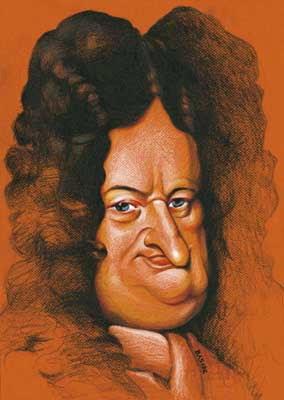
1, Gottfried Leibniz July 1646 - Hannover, November 14, 1716
Leibniz
The search aimed at the conception, more akin to the logic of a universal language or script, hence the need to find the alphabet of science, Leibniz seeks primitives that allow you to be a universal feature for him, the number is the most primitive and of course, believe that the primitive notions (innate ideas) can be symbolized by means of characters.
Leibniz called "feature" to its claim to form an independent and universal language, endowed with a rational structure, complex concepts are either produced from combinations of the signs simple notions or mathematical operations on product characteristics that are simple notions, the universal language could serve as the metaphysical sciences but not in the case of morality.
Leibniz intends to build a system of "reasons" derived from the combination of primitive terms and rules that allow the formation of a universal characteristic, but to form words should set rules of processing and / or replacement of components for primitive formation of a body that promotes the knowledge to all mankind.
Believes in the first set of truths, the truths of mathematics and pure logic therefore seeks for knowledge, a language similar to mathematics because it belongs to the realm of identity and of the science itself is the transformation of these identities. Leibniz
use the mathematical procedure, but without the number, only using your function to the combination of characters that compose it, in the disposition or connection of these characters and their analysis, since, following the rules can considered the truth or falsity of the proposition in mathematics is not necessary to go to things but the truth is shown by the rules.
There is equivalence between those characters and formulas that can replace each without violating the laws of calculation, there are other relationships, eg inclusions, similarities and determinations.
We can change the system of signs like no truth for this change, or depend on our power, whatever the characters selected must have an order in these characters, and only one, that is true, ie corresponding real order of things. There is a certain similarity between objects, reality and the various sets of characters
The characters consist of what is in arbitrary but what is true and not depend on our will, ie their relationship to things, occur because the reasoning has determined whether such characters are employed or equally if you are employed other, but when stored the resulting ratio of the relationship of characters that appears when replacing or comparing, that we can relate the same properties of the numbers are relative to the numbering system and therefore have an accidental and non-essential characters, in no way arbitrary, they are eternal and necessary truths
Leibniz distinguishes between necessary truths and contingent truths, necessary truths are those that are necessarily so, you can not think of another way _All eg triangle has three lados_ no other way of thinking than a triangle with three sides, contingent truths can be possible, but may not be.
also be taken into account the classical logical structure of thought is that human thought does not accept that 'P and not P' is true or not P and P 'is false, there is no other way of thinking.
0 comments:
Post a Comment